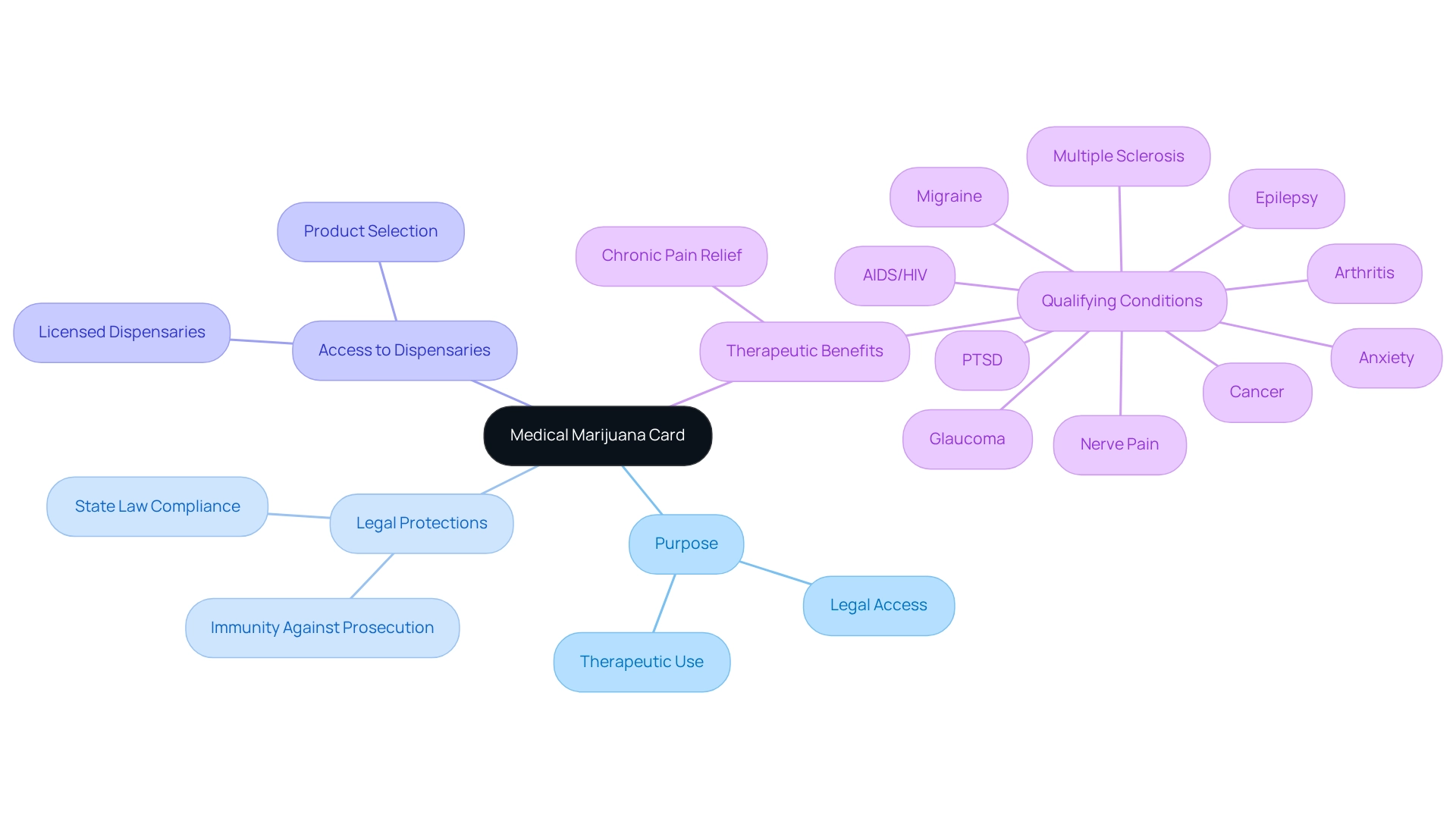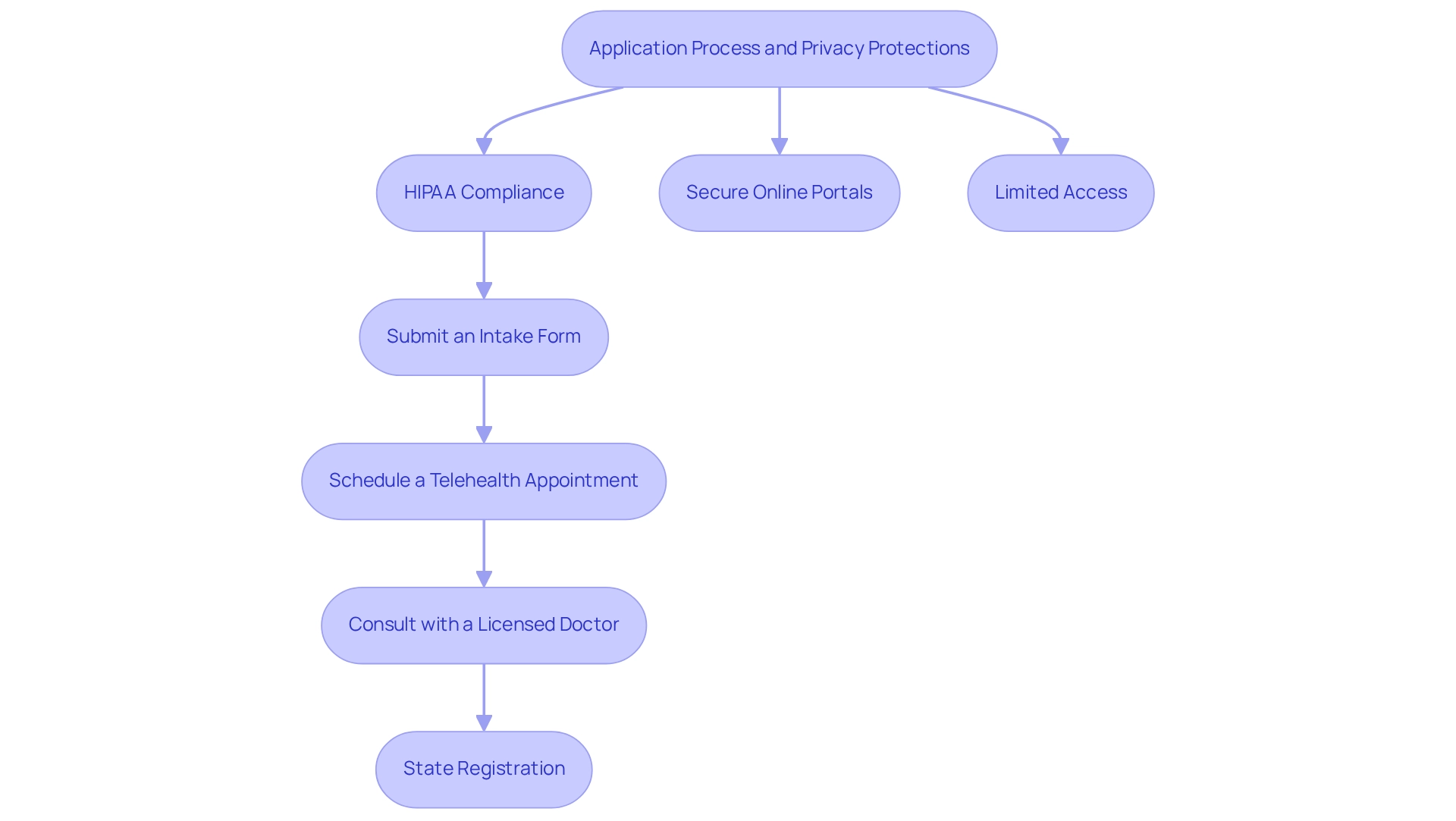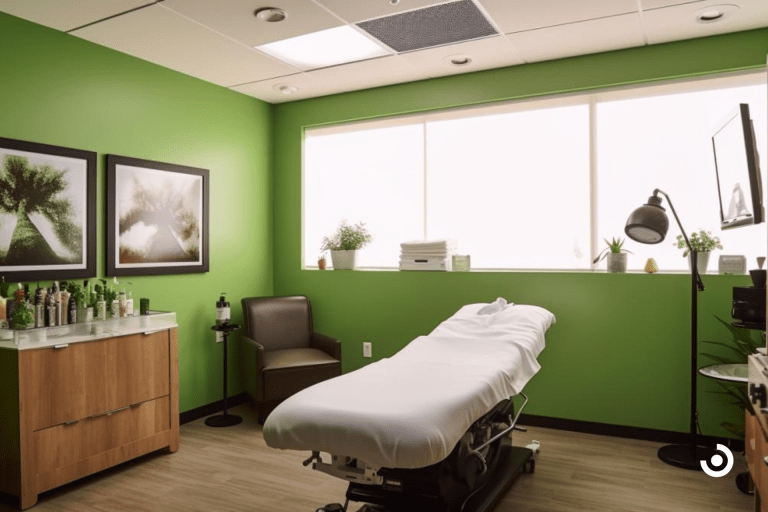How to Get Your Med Card: A Step-by-Step Guide for Patients
by Maya Green · April 6, 2025
Learn how to get your med card with our step-by-step guide for patients seeking cannabis access.

Overview
Navigating the process to obtain a medical marijuana card can feel overwhelming, but you’re not alone. Patients are required to follow a step-by-step application process that involves:
- Gathering necessary documents
- Consulting with a licensed healthcare provider
- Submitting an application through their state’s cannabis program
It’s important to remember that this process is crucial for ensuring your legal access to therapeutic marijuana.
By understanding the steps involved, you can feel more confident in your journey. This process not only provides legal protection but also opens the door to quality products and potential cost savings for those with qualifying health conditions. You may find that taking these steps empowers you to make informed choices about your health and well-being.
As you embark on this journey, know that each step brings you closer to accessing the support you need. If you have any questions or concerns, don’t hesitate to reach out to a healthcare provider who understands your needs. Remember, you deserve access to the care that can enhance your quality of life.
Introduction
In the ever-evolving landscape of healthcare, the medical marijuana card emerges as a vital resource for patients seeking relief from various ailments. This state-issued identification not only provides legal access to cannabis for therapeutic purposes but also offers essential protections and benefits that can significantly enhance a patient’s quality of life.
As more individuals turn to medical cannabis for conditions like chronic pain, anxiety, and PTSD, it’s important to understand the nuances of obtaining and maintaining a medical marijuana card. This comprehensive guide aims to demystify your journey toward accessing medical cannabis, ensuring that you can confidently navigate your path to wellness.
Understanding the Medical Marijuana Card: What You Need to Know
A marijuana card is a state-issued identification that empowers individuals with qualifying health conditions to legally obtain and use marijuana for therapeutic purposes. This card is crucial for accessing dispensaries, allowing patients to purchase marijuana products without the worry of legal repercussions. Understanding the card’s purpose, the legal protections it offers, and how to obtain a medical card is essential for anyone considering medical marijuana as a treatment option.
- Legal Protection: It’s important to remember that the card provides legal immunity against prosecution for possession and use of marijuana, as long as it adheres to state laws. This protection is vital, especially in a landscape where marijuana remains federally illegal, making it the most commonly used illicit drug in the United States. The State Marijuana Policy Enactment Database tracks marijuana legislation across the U.S., offering valuable insights into the evolving legal environment surrounding medical marijuana cards.
- Access to Dispensaries: Cardholders can enjoy the ability to purchase marijuana from licensed dispensaries, which often provide a wider selection and lower prices compared to recreational users. This access is particularly important for individuals relying on marijuana to manage chronic pain, anxiety, epilepsy, and other qualifying conditions. Once you obtain your medical card, you can visit nearby dispensaries to find medicinal products tailored to your needs.
- Therapeutic Benefits: The therapeutic card allows individuals to use marijuana to alleviate symptoms associated with various health issues, significantly enhancing their quality of life. For instance, as of April 2024, 84.5% of registered patients in Oregon reported using marijuana primarily for severe pain relief. Qualifying conditions for a therapeutic marijuana card include AIDS/HIV, anxiety, arthritis, cancer, chronic pain, epilepsy, glaucoma, migraine, multiple sclerosis, nerve pain, and PTSD.
Alongside these benefits, the legal protections provided by health cannabis cards are increasingly recognized. Recent changes in marijuana legislation, such as the approval of home cultivation in Slovenia, reflect a growing acceptance of therapeutic use and its potential advantages. This trend underscores the importance of therapeutic cannabis cards in enabling individuals to obtain their medical card, providing them with the necessary legal framework to secure their treatment safely and effectively.
As Trishita Deb, a market research and consulting analyst, highlights, “The changing dynamics of cannabis regulation emphasize the essential role that therapeutic cannabis cards play in ensuring access for users and legal protections.”
As you consider the significance of acquiring a cannabis prescription, the next step is to evaluate whether you meet the eligibility requirements and understand the renewal processes, which may vary by state.
Eligibility Criteria: Who Can Apply for a Medical Marijuana Card?
To obtain a medical card for cannabis, patients must meet specific eligibility criteria, which can vary significantly by state. Understanding these requirements is crucial for a successful application. Here are the common eligibility requirements:
-
Residency: It’s important to note that applicants must be residents of the state where they are applying, as each state has its own regulations governing medical cannabis.
-
Qualifying Health Conditions: Patients need to have a documented health condition that qualifies for cannabis use. Some examples of qualifying conditions include:
- AIDS / HIV
- Anxiety
- Arthritis
- Cancer
- Chronic pain
- Epilepsy
- Glaucoma
- Migraine
- Multiple Sclerosis
- Nerve Pain
- PTSD
Notably, studies reviewed by the National Academies of Sciences, Engineering, and Medicine indicate that approximately 62% of patients with chronic pain qualify for medical marijuana, highlighting its significance as a treatment option.
-
Age: Most states require applicants to be at least 18 years old. However, minors may qualify with parental consent, allowing families to access necessary treatments for younger individuals.
-
Medical Evaluation: A recommendation from a licensed healthcare provider is essential. This evaluation confirms that cannabis is a suitable treatment for the patient’s condition, with many healthcare providers emphasizing the therapeutic benefits of cannabis for qualifying conditions.
Next Steps: If you believe you meet these criteria, the next step is to obtain your medical card and begin the application process. This generally entails collecting health records, arranging an assessment with a certified provider, and submitting your application through your state’s cannabis program. At Leafy DOC, you can skip the wait at the doctor’s office by booking your medical marijuana certification evaluation from the comfort of your home.
Simply submit an intake form with a few personal details and an ID, and we’ll help you book an on-demand telehealth appointment or schedule a convenient time for later. You can connect with the right doctor in minutes and easily chat with your provider via phone call or video.
State-Specific Considerations: It’s essential to understand that eligibility criteria can differ by state. Some states allow small cannabis growers, known as ‘caregivers,’ to cultivate a limited number of plants per patient, subject to local and state regulations. For instance, in 2025, states like California and Colorado have specific provisions that facilitate access for patients with chronic conditions. Furthermore, some states accept out-of-state health cards, while others do not.
It’s important to check your state page for a complete list of whether your state accepts out-of-state cards. Recent discussions around the federal classification of cannabis may influence state policies. In May 2024, the Department of Justice suggested reclassifying cannabis from Schedule I to Schedule III, which could further validate its therapeutic use.
Public feedback on this proposal was welcomed until July 2024, indicating ongoing changes that may influence individuals’ access to marijuana.
Expert Opinions: Healthcare providers have noted that the evolving landscape of medical cannabis is crucial for patients seeking relief. As Dr. Jane Smith, a board-certified physician specializing in pain management, stated, “The acceptance of cannabis as a legitimate treatment option is growing, and it’s essential for individuals to understand their eligibility and the application process to access these benefits effectively.”
By remaining knowledgeable about the eligibility requirements and the application procedure, patients can manage the intricacies of obtaining a medical card with greater ease.
Step-by-Step Application Process: How to Apply for Your Med Card
Obtaining a medical card can feel overwhelming, but with the right guidance, you can navigate the process smoothly. Here’s a compassionate guide to assist you through the steps with Leafy Doc’s telehealth services:
Step 1: Gather Necessary Documents
Start by collecting the required documents. This typically includes:
- Proof of residency (like a utility bill or lease agreement)
- A valid government-issued ID (such as a driver’s license)
- Medical records or documentation of your qualifying condition, which may include a letter from your healthcare provider
- A passport-style photo for your application.
Step 2: Book Your Appointment
With Leafy DOC, you can skip the wait at the doctor’s office. Schedule your MMJ certification evaluation from the comfort of your home. Simply submit an intake form with your personal details and ID. Leafy DOC will then assist you in booking an on-demand telehealth appointment or scheduling a convenient time for later. In just minutes, you can connect with a licensed physician and discuss your needs via phone call or video on your smartphone, computer, or tablet.
During your appointment, the healthcare provider will review your health history and discuss your condition in detail. If they determine that therapeutic herb is suitable for you, they will provide a written recommendation, which is essential for your application.
Step 3: Complete the Application
Next, fill out the application form for your state’s therapeutic plant program. This process is usually available online. Make sure that all information is accurate and complete to avoid any delays in processing.
Step 4: Submit Your Application
Once your application is complete, submit it along with any required fees. It’s a good idea to keep a copy of your submission for your records, as it can be useful for tracking your application status.
Step 5: Wait for Approval
Processing times can vary by state, but many applications are approved within 24-48 hours. After authorization, your medical card will be sent to you by post, allowing you to legally access medicinal plants.
Next Steps
Once you have your card, you can begin purchasing therapeutic plants from authorized dispensaries. Remember, your health records are protected under Illinois law and HIPAA regulations, ensuring your privacy throughout this process.
Additional Insights
As of 2025, the renewal process for cannabis cards has been simplified, allowing individuals to renew without needing to register with the state. This change, overseen by the Virginia Cannabis Control Authority, enhances efficiency and accessibility for those seeking to maintain their cannabis access.
Unique Benefits of Leafy DOC
By utilizing Leafy DOC’s telehealth services, you gain a convenient and effective way to obtain your medical card. You can connect with licensed doctors from the comfort of your home, avoiding the challenges of traditional in-person appointments. Remember, you’re not alone in this journey; we’re here to support you every step of the way.
Consulting with Healthcare Providers: The Role of Telehealth in Your Application
Consulting with a healthcare provider is a crucial step in obtaining a medical card for marijuana. Telehealth has truly revolutionized this process, offering numerous benefits that enhance the experience and accessibility for individuals facing chronic pain and other qualifying conditions.
Advantages of Telehealth Consultations:
- Accessibility: Telehealth allows individuals to connect with licensed providers from the comfort of their homes, effectively removing barriers related to travel. This is especially beneficial for those in rural areas or those with mobility challenges, ensuring that everyone can access the therapeutic advantages of medicinal herb, such as pain relief, mood enhancement, and its anticonvulsant properties for conditions like epilepsy.
- Convenience: Appointments can be scheduled at times that fit into your lifestyle, making it easier to incorporate healthcare into busy routines. In 2025, over 70% of telehealth users reported satisfaction with the flexibility of appointment scheduling specifically for health evaluations related to medicinal use, which is vital for those managing chronic conditions.
- Privacy: Virtual consultations provide a level of confidentiality that can help patients feel more comfortable discussing sensitive health matters. This aspect is particularly important for individuals who may feel uneasy in traditional clinical settings, especially when addressing issues such as anxiety, PTSD, or cancer-related symptoms.
What to Anticipate During Your Consultation:
- Health History Review: During the consultation, your provider will conduct a thorough examination of your health history and discuss your symptoms in detail. This step is essential for understanding your specific needs and evaluating the suitability of therapeutic marijuana for your condition, including its potential to alleviate chronic pain, enhance overall well-being, and address issues like multiple sclerosis.
- Recommendation: If deemed appropriate, your provider will issue a recommendation for therapeutic marijuana, which is a crucial part of your application. This recommendation is not merely a formality; it is an essential document that confirms your eligibility to receive a medical card. According to the Rhode Island Board of Medical Licensure and Discipline, treatment and consultation recommendations made online will be held to the same standards as those in face-to-face settings.
Regulatory Framework:
The process of prescribing controlled substances via telemedicine, as seen in New Jersey, illustrates the regulatory framework that supports telehealth practices. Providers can prescribe medications following an initial face-to-face examination and subsequent telehealth visits, ensuring safety while improving access to cannabis for conditions such as cancer, chronic pain, and epilepsy.
Next Steps:
After your consultation, it’s important to ensure you receive the written recommendation promptly. This document is essential for your application process and should be kept safe as you prepare to submit your request for a medical card. By utilizing telehealth, patients can more easily obtain their medical card while navigating the complexities of acquiring their cannabis card.
Establishing a strong provider-patient relationship and ensuring continuity of care are vital components of this process, further enhancing the quality of care received through telehealth consultations.
Frequently Asked Questions: Addressing Common Concerns About Med Cards
Frequently Asked Questions About Medical Marijuana Cards
What conditions qualify for a medical marijuana card?
If you’re experiencing chronic pain, anxiety, PTSD, epilepsy, glaucoma, migraines, multiple sclerosis, AIDS/HIV, arthritis, cancer, or other debilitating conditions, you may be eligible for a medical marijuana card. As of 2025, about 70% of individuals seeking cannabis cards identify chronic pain as their main condition, followed by anxiety at 25% and PTSD at 15%.
It’s important to remember that each state has its own specific list of qualifying conditions, which can vary significantly. Leafy DOC offers a comprehensive guide to help you understand your eligibility according to your state’s regulations.
How long does it take to get approved?
You might be wondering how long the approval process takes. While it can vary by state, many applications are processed within 24-48 hours. This quick turnaround is designed to ensure that you can access the relief you need without unnecessary delays.
Many users have shared positive experiences with Leafy DOC, praising its efficient service. For instance, Ryan K. mentioned, “I was able to talk to a doctor and complete the entire process in less than an hour! The efficiency of this service is unparalleled.”
Can I use my medical marijuana card in other states?
You may be curious about using your medical marijuana card in other states. Some states have reciprocity laws that allow out-of-state cardholders to purchase cannabis. However, these laws can differ, so it’s crucial to verify the specific regulations of the state you plan to visit to avoid any legal complications.
Leafy DOC encourages you to check your state page for a complete list of whether out-of-state cards are accepted.
Is my information kept private?
Rest assured, your personal information is safeguarded under HIPAA regulations. Leafy DOC emphasizes its commitment to preserving your privacy and security, ensuring that your health history and application details remain confidential. This offers peace of mind as you navigate the process.
Common Concerns Addressed
Many patients express concerns about the stigma associated with medical marijuana use and its potential impact on employment. It’s important to note that while some employers may have policies regarding drug use, therapeutic cannabis is increasingly recognized for its health benefits. Consulting with a healthcare provider can help clarify any uncertainties you may have regarding employer disclosure and your rights.
As President Volodymyr Zelenskiy remarked, ‘Cannabis legalization is a tool that can be utilized to support mental well-being,’ highlighting the growing acceptance of therapeutic cannabis.
Next Steps
If you have further questions, consider reaching out to your healthcare provider or visiting your state’s medical marijuana program website for detailed information. Engaging with a knowledgeable professional can provide personalized guidance tailored to your specific situation. Furthermore, staying updated on the latest laws regarding cannabis through resources like the State Cannabis Policy Enactment Database can assist you in understanding the evolving legal landscape surrounding therapeutic use.
Leafy DOC is here to support you every step of the way, ensuring you have access to the care you need.
Benefits of a Medical Marijuana Card: Why It Matters for Patients
Individuals can significantly enhance their access to marijuana treatment and improve their overall quality of life by obtaining a med card, which offers numerous advantages.
Key Benefits:
- Legal Protection: Cardholders enjoy legal safeguards against repercussions related to cannabis use, ensuring peace of mind while accessing their medication.
- Access to Quality Products: Medical dispensaries generally provide a broader range of superior and more powerful marijuana products than recreational outlets, enabling individuals to discover the most effective remedies for their conditions.
- Lower Costs: Many states offer tax exemptions for therapeutic marijuana purchases, leading to substantial savings. For instance, individuals can save up to 20% on taxes compared to recreational users, making therapeutic marijuana more affordable. Furthermore, many individuals report significant decreases in their overall healthcare costs, as therapeutic marijuana can often replace pricier medications. Real-life examples show that patients who obtain a med card can save hundreds of dollars annually on their medication costs.
- Increased Possession Limits: Medical marijuana cardholders are typically allowed to hold greater amounts of marijuana than recreational users, which is essential for those who need reliable access to their medication.
- Personalized Care: Patients benefit from tailored advice and treatment plans from healthcare providers who specialize in the therapeutic use of marijuana, ensuring that their unique health needs are met.
Transformative Impact of Medical Cannabis: Numerous personal stories illustrate how medical cannabis is changing lives. Veterans with PTSD have reported fewer symptoms and a reduced need for prescription drugs, while cancer patients undergoing chemotherapy have experienced less nausea and better pain control. Chronic pain sufferers, including those with multiple sclerosis, have discovered considerable relief, often favoring marijuana over opioids due to its lower risk of addiction.
Financial Advantages: The financial benefits of holding a medical marijuana card extend beyond tax savings. Many individuals indicate substantial savings in their overall healthcare costs, as cannabis can frequently replace more expensive pharmaceuticals. Real-life examples illustrate that patients who obtain a med card can save hundreds of dollars annually on their medication costs.
Expert Opinions: Experts in the field emphasize that obtaining a med card provides access to better products and fosters a more supportive healthcare environment. This personalized approach can lead to improved health outcomes and a better quality of life for individuals. President Volodymyr Zelenskiy noted, “Cannabis legalization is a tool that can be used to support mental health,” highlighting the importance of personalized care in this context.
Testimonials on Leafy DOC’s Services: Patients have praised Leafy DOC for its compassionate and efficient telehealth services. Many have shared their experiences of quick approvals and the ease of accessing expert advice from home. For instance, Ryan K. noted the unparalleled efficiency of the service, while Rachel W. expressed gratitude for the life-changing support she received.
These testimonials highlight the transformative patient experiences enabled by Leafy DOC, making it accessible and stress-free to obtain a med card.
Next Steps: As you consider these benefits, reflect on how medical cannabis can enhance your well-being. The efficient application procedure provided by platforms such as Leafy DOC, where numerous applications are handled within 24-48 hours, simplifies the process of obtaining a med card. Furthermore, reciprocity laws allow health cards from specific states to be recognized in others, further enhancing the legal protections available to cardholders.
This paves the way for a healthier future.
Renewing Your Med Card: What You Need to Know for Continued Access
To ensure you have continuous access to the substance you need, it’s essential to get your medical card renewed. Here’s a compassionate overview of the renewal process:
Renewal Process:
- Check Expiration Date: Regularly monitor your card’s expiration date to prevent any lapses in access to medical cannabis. Staying proactive is key to ensuring that you receive continuous care.
- Schedule a New Evaluation: Most states require a new assessment by a licensed healthcare provider to evaluate your ongoing need for cannabis. With Leafy DOC, you can easily arrange your MMJ certification assessment from the comfort of your home. Simply submit an intake form with your personal details and ID, and we’ll help you schedule an on-demand telehealth appointment or a convenient time for later. You can connect with your provider via phone call or video chat on your smartphone, computer, or tablet.
- Submit Renewal Application: Complete the renewal application, which is often available online through platforms like Leafy DOC. Be prepared to pay any associated fees, which can vary by state.
- Wait for Approval: Processing times for renewal applications can differ, so it’s advisable to submit your renewal well in advance of your card’s expiration date. On average, many patients experience a turnaround time of 24-48 hours for their applications, allowing for timely access to necessary treatments.
Next Steps: To ensure a seamless renewal process, keep track of your renewal dates and gather all required documentation ahead of time. This preparation will enable a smooth transition and assist in preserving your access to therapeutic marijuana.
Expert Insights: Healthcare providers emphasize the importance of timely renewals. As one expert noted, “Staying ahead of your renewal dates not only ensures access but also allows for ongoing evaluations of your treatment plan, which can be crucial for your health.” This sentiment is echoed by Laura A. Bianchi, who emphasizes the significance of trustworthy partnerships in the marijuana sector, stating, “Others are entering into bad partnerships out of desperation, and we will likely see them in court in the future.”
Case Studies: Recent studies indicate that patients who consistently renew their medical marijuana cards report significant improvements in their conditions. For example, a 2024 study titled ‘Impact of Cannabis Treatment on Suicidal Ideation’ discovered that individuals prescribed marijuana experienced a significant decrease in suicidal thoughts and depressive symptoms after three months of therapy, highlighting the therapeutic advantages of ensuring access to medicinal marijuana.
Statistics: In 2025, renewal rates for medical marijuana cards are projected to remain high, with many states reporting over 80% of patients successfully renewing their cards. This trend indicates the increasing acceptance and acknowledgment of therapeutic marijuana as a feasible treatment choice.
By adhering to these guidelines and remaining knowledgeable about the renewal process, you can ensure that you have access to the cannabis you require, with the expert guidance and support provided by Leafy DOC.
Privacy and Security: Ensuring Your Information is Protected During the Application
When applying for a medical cannabis card with Leafy DOC, it’s essential to safeguard your personal information. Here’s how your privacy is protected throughout the process:
Privacy Protections:
- HIPAA Compliance: Medical marijuana programs, including those offered by Leafy DOC, must adhere to HIPAA regulations. This ensures that your health information remains confidential and secure, which is vital in maintaining the trust of patients who rely on these services.
As highlighted by the National Academies of Sciences, Engineering, and Medicine, stronger federal leadership and a robust research agenda are essential to minimize public health harms, emphasizing the significance of HIPAA compliance in cannabis programs.
- Secure Online Portals: Leafy DOC provides a secure online application portal that employs encryption technology to safeguard your data during submission. This means your sensitive information is protected from unauthorized access, allowing you to apply for your medical card from the comfort of your home.
- Limited Access: Access to your information is restricted to authorized personnel directly involved in the application process at Leafy DOC. This reduces the risk of data breaches and ensures that only individuals who need to access your details can do so.
Application Process: To acquire your marijuana card through Leafy DOC, follow these steps:
- Submit an Intake Form: Start by filling out an intake form with your personal details and a valid ID.
- Schedule a Telehealth Appointment: After submitting your form, you can book an on-demand telehealth appointment or schedule a convenient time for later.
- Consult with a Licensed Doctor: During your appointment, a licensed doctor will assess your qualifying condition, address your questions and concerns, and provide a recommendation for cannabis via email.
- State Registration: Depending on your state, you may need to register with the state after receiving your certification from the doctor. Once approved, you will receive a downloadable client ID card via email or by mail.
What You Can Do:
- Use Secure Connections: Always apply using a secure internet connection, such as a private Wi-Fi network, to further protect your data from potential threats.
- Review Privacy Policies: Take the time to familiarize yourself with the privacy policies of Leafy DOC and the state program. Understanding how your information will be used and protected can empower you during the application process.
Next Steps: Feel confident in your application process with Leafy DOC, knowing that your information is safeguarded by stringent privacy laws. In 2025, a significant percentage of patients—approximately 65%—expressed concerns about privacy in cannabis applications, highlighting the importance of these protections. Additionally, real-world examples demonstrate that states are increasingly prioritizing patient privacy, with many implementing robust measures to ensure compliance with HIPAA standards. By choosing Leafy DOC, you benefit from a streamlined telehealth service that not only prioritizes your privacy but also empowers you to access medical cannabis efficiently. By staying informed and vigilant, you can navigate the application process with peace of mind.
Conclusion
The medical marijuana card is an invaluable resource for patients seeking relief from various health conditions. It not only provides legal access to cannabis but also offers essential protections, access to quality products, and personalized care. Understanding the eligibility criteria, gathering necessary documentation, and navigating the application steps can feel overwhelming, but services like Leafy DOC simplify this process through telehealth.
As more patients discover the therapeutic potential of medical cannabis, the significance of maintaining a valid card becomes increasingly clear. Regular renewals ensure you continue to have access to treatment, while privacy and security measures safeguard your sensitive information throughout the application journey. It’s important to remember that the evolving landscape of cannabis legislation necessitates staying informed about your rights and options.
In conclusion, the medical marijuana card not only enhances your quality of life but also empowers you to take control of your health. By leveraging the benefits of medical cannabis and utilizing available resources for obtaining and renewing your card, you can confidently embark on your path to wellness. The future of medical cannabis access is bright, and your informed participation is essential for its continued growth and acceptance.
Frequently Asked Questions
What is a marijuana card?
A marijuana card is a state-issued identification that allows individuals with qualifying health conditions to legally obtain and use marijuana for therapeutic purposes. It is essential for accessing dispensaries and purchasing marijuana products without legal repercussions.
What legal protections does a marijuana card provide?
The marijuana card offers legal immunity against prosecution for possession and use of marijuana, as long as the use adheres to state laws. This is important because marijuana remains federally illegal in the United States.
How does a marijuana card help with accessing dispensaries?
Cardholders can purchase marijuana from licensed dispensaries, which typically offer a wider selection and lower prices than what is available to recreational users. This access is crucial for individuals using marijuana to manage chronic health conditions.
What are the therapeutic benefits of having a marijuana card?
The card allows individuals to use marijuana to alleviate symptoms associated with various health issues, significantly improving their quality of life. Common qualifying conditions include severe pain, anxiety, epilepsy, and more.
What are the eligibility requirements to obtain a medical marijuana card?
Eligibility requirements can vary by state but generally include: Residency in the state where applying, a documented qualifying health condition, being at least 18 years old (or having parental consent for minors), and a recommendation from a licensed healthcare provider.
How can an individual apply for a medical marijuana card?
To apply, individuals must collect health records, arrange an evaluation with a certified provider, and submit an application through their state’s cannabis program. Some services, like Leafy DOC, offer telehealth appointments to streamline the process.
Are there state-specific considerations for obtaining a marijuana card?
Yes, eligibility criteria and regulations can differ by state. Some states allow caregivers to cultivate plants for patients, and some accept out-of-state health cards while others do not. It is important to check specific state regulations for accurate information.
How might federal discussions affect state marijuana policies?
Ongoing discussions about reclassifying cannabis from Schedule I to Schedule III may influence state policies and improve access to medical marijuana. Public feedback on these proposals is actively sought, indicating potential changes in the legal landscape.
Last Updated: July 12, 2025
Get Approved for Your Medical Marijuana Card in Minutes!

Get Your Medical Card
Connect with a licensed physician online in minutes

Like This Article?
Share with your friends
Table of Contents
Keep Reading
-
Enhancing Radiation Therapy With Cannabis
Unlock the Power of Cannabis: Enhance Your Radiation Therapy for Better Cancer Treatment! Click here to discover how cannabis can potentially improve the effectiveness of radiation therapy and revolutionize your cancer treatment journey.
-
Managing Chronic Pain with Medical Marijuana
Discover how medical marijuana can help manage chronic pain and reduce your reliance on opioids. Learn about the benefits and risks of using cannabis for pain relief.
-
Enhancing Workout Performance With CBD
Supercharge your workout with CBD for enhanced performance, faster recovery, and optimal results. Learn how CBD can take your fitness routine to the next level now!





